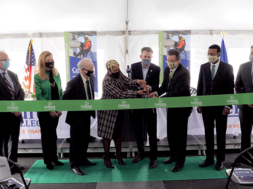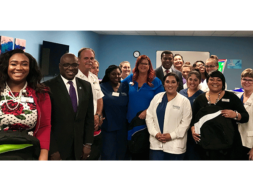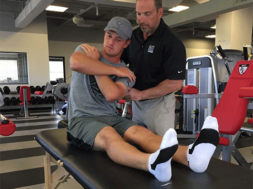
By Richard Lombardo, Ph.D., Vice-President of Education and Development, Valley College
Valley College, representative of many other colleges and universities throughout the country, boasts a diverse group of nontraditional students. As nontraditional students, each individual comes to Valley with a series of personal factors and experiences that influence their academic, retention, and job placement needs and preferences. The composition of our student population is comparable to the data provided by Fishman, Ludgate, and Tutak (2017, para. 5), who quotes Brown, McNair, et al (2016), who reported that “Today, 44% of college and university students are 24 years of age or older. Thirty percent attend class part-time, 26% work full-time while enrolled, and 28% take care of children or other dependents while pursuing their postsecondary studies. On top of that, 52% are the first in their families to seek higher education, 42% come from communities of color, and 18% are non-native English speakers.” Student characteristics such as these, coupled with the explosion of blended and online learning opportunities that are offered with traditional opportunities have resulted in a need for colleges and universities to be prepared to provide an assortment of academic, retention-oriented, and career/professional development-based student services.
The additional services, offered through the student life cycle are used to complement subjects that include curriculum, instructional strategies, and student resources, which are extremely vital elements of an institution’s long-term success and our ability to meet our student outcome goals.
Based on these factors, and the growing percentage of nontraditional students in college classrooms, Valley College has created a Student Life Cycle to ensure that we are able to meet student retention and satisfaction goals and to ensure our student’s academic growth and professional readiness.
The driving factors that support the Valley College Student Life Cycle
The Valley College Student Life Cycle is a well-defined road-map for student activities from initial enrollment through graduation. From an organizational perspective, the key factor in the design and delivery of the Student Life Cycle is Valley’s ability to break down departmental business silos, create a unified message and approach to how we work with our students, efficient and effective processes, and the initial training and ongoing development that is deployed to ensure each department understands their role, the role of all other departments, and how each department contributes to the Student Life Cycle.
Based on this approach, Valley College is able to establish confidence and credibility with our students that translates to a high level of trust from our students to guide their educational efforts, ensure that their individual needs are met, retention obstacle are countered, and that they are fully prepared to enter the industry of their choosing upon graduation. This approach not only enables an optimal student experience that translates into high levels of student satisfaction, but enables Valley College to be in a position to meet each of their student success outcomes. Fishman, Ludgate, and Tutak (2017) support this position when they state that when attempting to improve student outcomes, and the definition of those outcomes as illustrated in the Student Life Cycle, “the institution can develop a holistic, student-centered strategy across all dimensions of the student experience, from the classroom to support services to campus operations to relationships with the broader community, with all designed to foster measurable improvements in persistence rates, time to graduation, and completion rates” (para. 11). Building on this concept, Valley College has created a series of strategies across each department to ensure that not only is each department working together as one unit, but, these joint efforts are undertaken to ensure student success and our ability to meet student success outcome goals and requirements.
What are the Valley College Student Life Cycle strategies?
Valley College’s Student Life Cycle is deployed through a series of stages in accordance with a student’s progression through their program as a diploma, associate degree, or bachelor’s degree student. The activities are synthesized with assignments in designated and strategically selected classes for each program. As each of these activities are completed, students are shepherded into and/or offered a litany of Student Resources based on their needs and requests along with instructor or staff recommendations. The following information and two tables demonstrate the contents of the Valley College Student Life Cycle.
Educational workshops
The Valley College Student Life Cycle starts with a series of educational workshops that are delivered within each designated level of a student’s program. The content areas of these workshops are meant to account for student retention, academic performance, student placement, and professional development. The pre-emptive approach of these educational workshops is supported by Grabowski et. al (2016), who stated that “nontraditional students have significantly lower retention and graduation rates when compared to their traditional counterparts. Thus, identifying barriers to college completion is imperative to reversing this trend” (para. 12). Grabowski, et al (2016) go on to quote Jennings (2007), who stated that through “proactive intervention, the strategies that address challenges before they negatively impact an entity, requires that academic institutions align their services with the needs of nontraditional students” (para. 12). Therefore, in accordance with this position, Valley’s goal is to provide a series of supplemental services and activities that include pertinent educational workshops to ensure that we are countering well-known and industry acknowledged retention based issues that face our students in each of our learning environments.
Valley College’s supplemental educational workshops are delivered by a designated member of each campus.
The workshops in the student’s first section of courses begin with topics that focus on an individual transitioning into college and the development of essential student skills.
Students will learn how to organize, prioritize, and develop time management skills to ensure that they are able to balance their school work with all other non-college based responsibilities and activities in their life. Building on these initial skills, students will begin to work on emotional intelligence and soft skill based subjects that are complemented with a focus on financial literacy and a student’s knowledge on the requirements and options that encompass their financial aid loans upon graduation. At this stage, diploma and associate degree students will finish with their program and bachelor’s degree students will move to their final four stages and the second half of their program.
In accordance with each stage of educational workshops, students will be provided with another level of activities focused on critical thinking, problem-solving, emotional intelligence and professional development skills. This approach has been designed to help students develop the critical thinking and problem-solving skills necessary to work through any off-campus student retention issues. Through a high level of academic and non-academic based advising and coaching efforts, our team will help the student use these skills to think through and take well-thought-out action specific to any potential academic or non-academic retention based problem or challenge that the student could be facing. The goal of this approach is to synthesize our efforts to retain the student and to supplement primary educational content with a series of well-organized and strategically placed activities that will help students develop skills that will enhance their ability to remain in school. The following table illustrates the subject matter for each workshop along with the placement of each activity within Valley College programs.
Table 1: Student Life Cycle Educational Workshops
| Student Life Cycle Stage | Student Degree Stage | Student Life Cycle Educational Workshop Topics |
| 1 | Diploma, Associate, and Bachelor’s | Transitioning to College, How to Effectively Take Notes, Productive Study Habits, and Test-Taking Strategies |
| 2 | Diploma, Associate, and Bachelor’s | Time-Management, Organization, and Prioritization, Professionalism, Customer Service, and Communication |
| 3 | Diploma, Associate, and Bachelor’s | Financial Literacy |
| 4 | Bachelor’s | Developing HABE’s (Habits, Attitudes, and Beliefs) |
| 5 | Bachelor’s | Cultural Diversity and Critical Thinking |
| 6 | Bachelor’s | Ethical Decision-Making and Problem-Solving |
| 7 | Bachelor’s | Conflict Resolution |
Customized career planning sessions
In coordination with the supplemental educational workshops described above, Valley College has also invested heavily into our Career Services department. As opposed to simply leaning on the academic programs and supplemental educational workshops to drive a student’s ability to both graduate and be placed in their industry, Valley College has taken great efforts to synthesize the efforts of our Career Services team with the Student Life Cycle. This effort includes a group of coordinated activities, a course devoted strictly to Career Development in each program, a common language, and a series of programs and activities meant to optimize the value that we are able to bring to our students. This is a growing trend across the country, as presented by Ayoubi (2017) who stated that “the integration of academic and career advising services is gaining momentum across university campuses as the life-long benefits of this approach for students become increasingly clear” (para. 1).
In coordination with this approach, Valley College’s Student Life Cycle contains a series of student-centric activities that begin with our Customized Career Plan (CCP) meetings.
The CCP meetings are the cornerstone of the Career Services department. These meetings are conducted with program-specific Career Service Advisors (CSA) and the student on a one to one basis. Each meeting, as demonstrated in Table 2, contains a specific focus area and accounts for a series of progressive goals that start at a fundamental level and over time, grow into a series of discussions that will enable each student to come away from Valley College with a Customized Career Plan. The Customized Career Plan will include all of the necessary tools, resources, and skills necessary to help a student enter their chosen industry. In conjunction with these meetings are a series of events that include job fairs, programmatic speakers/employer visits, mock interviews, certification prep workshops and licensure prep (programmatic), professional attire support, and ongoing job search support as a Valley College alum.
The theme of this process is to have our students focus on the end goal in mind, to remain positive and motivated about their education and ultimately, remain focused on developing the foundation for their future career. These meetings have also been created to serve as a well-organized and productive method to build a student’s personal brand, prepare them for their job search, and put that job search plan in motion using a plan that accounts for their personal and professional resources, preferences, and goals. Finally, this approach also creates a cultural expectation and process where students will fully take advantage of their Career Services Department and build a strong and lasting professional relationship with the CSA that will carry over to their work as a Valley College alum as opposed to leaving our institution and not fully taking advantage of the resources offered to each student.
Table 2: Customized Career Plan Meetings
| Meeting No. | Student Degree Stage | CCP Focus | Goal of the Activity | |
| 1 | Diploma, Associate, and Bachelor’s | Self-Assessment | Students will get to know themselves through a detailed self-assessment under the direction of the CSA that will include an identification and analysis of the student’s goals, interests, and resources. | |
| 2 | Diploma, Associate, and Bachelor’s | The Initial Construction of the Customized Career Plan | As part of career development, students will now clarify their goals and objectives specific to their job search and their studies and further, design the strategy for their job search and placement efforts. | |
| 3 | Diploma, Associate, and Bachelor’s | Implementing the Customized Career Plan | Students will refine and lock in their initial job search plan and then, focus on the implementation of their job search plan. This will include a final resume, cover letter, etc. along with the supporting documentation to lock in their strategy and refine their interview and negotiation skills. | |
| 4 | Bachelor’s | Determining What is Relevant to the Student | Students, with the support of the CSA, will start to determine what is important to them as a future professional and based on this analysis, begin to focus on both their Capstone topic and the segment of the industry that they wish to join upon graduation. | |
| 5 | Bachelor’s | Re-visiting and Refining Your Interview Skills Through the Mock Interview | In this activity, students will re-visit the mock interview process and work through an interview with their CSA in person or via video. The interview will be a bit more detailed than their work as a diploma or associate degree student and will be for a position at a management and/or team leader role. | |
| 6 | Bachelor’s | Setting and Conducting an Informational Interview With an Organization in the Field you Wish to Pursue | In this activity, students should now be in a position where they have a defined level of interest in a given field/segment of the industry and then, using that as a driver, approach and then interview a given company that the student would like to join upon graduation. The CSA will prep the student on how to identify, approach, and productively work with a given company through this activity. CSA’s will then illustrate how the student can compile the information, use it for their Capstone and future professional use. | |
| 7 | Bachelor’s | Exit Interview and Implementing Your Job Search and/or Future Educational Pursuits | Students will finalize their updated Customized Career Plan, account for any updates to their resume and supporting documentation and create an action plan to implement their Career Plan. |
Organizational strategies that are deployed to drive the Valley College Student Life Cycle
In order to deliver this sort of program to our students, Valley College spent considerable time developing an organizational platform and supporting operational strategies. In order to ensure that this program met the needs of our students and was a service where we could sustain delivery, Valley College embarked on this process with a thorough and detailed level of primary research that started with a clear definition of our organizational goals and then, moved to a review of our student demographics, departmental performance levels, metric goals versus actual performance, and student/college resources. This effort was complemented with a series of secondary research efforts that included a review of a series of recent retention and placement based studies that centered on nontraditional postsecondary students.
Based on these two forms of research, Valley created a full project outline that accounted for subjects that began with feasibility, our key organizational objectives, and the measurable activities that needed to be conducted to ensure optimal performance. Building on these planning activities, Valley College then conducted a feasibility activity, designed an implementation model, modeled a rollout, established points for program analysis and evaluation, and methods to continually train and develop our employees on this concept.
Based on this effort, Valley was able to construct and deploy a program that was fully supported by each department and constructed in a manner where each department is able to contribute to our organizational goals.
In accordance with implementation, Valley created a detailed series of processes to ensure a consistent and high level of execution, efficiency, and room for our team to make operational adjustments in accordance with the growth of our school. In an effort to manage and track each step of the Student Life Cycle, Valley College also created a series of activities in our Student Management Database that allows us to measure key student outcomes from a reporting perspective, track the execution of activities at a day to day management level, communicate with one another, and ensuring accurate and complete documentation on each student. Finally, this approach using our Student Management Database also enables our team to measure performance and create departmental checks and balances that accounts for Admissions, Academics, Career Services, Financial Aid, and campus operational support teams. This total team approach, coupled with a clear, defined, and efficient process with technological tools, has enabled Valley College to create a student-centric model to ensure an optimal student experience that culminates with graduation, certification, licensure, and job placement.
For more information, please contact Richard Lombardo, Ph.D., Vice-President of Education and Development at Valley College, rlombardo@valley.edu.
References
- https://www2.deloitte.com/us/en/insights/industry/public-sector/improving-student-success-in-higher-education.html#high-impact-learning
- https://www2.deloitte.com/us/en/insights/industry/public-sector/improving-student-success-in-higher-education.html#comprehensive-support-services
- https://www2.deloitte.com/us/en/insights/industry/public-sector/improving-student-success-in-higher-education.html#student-focused-operations
- https://www2.deloitte.com/us/en/insights/industry/public-sector/improving-student-success-in-higher-education.html#strategic-external-partnerships
References:
Fishman, Ludgate, and Tutak, (2017). Success by Design. Retrieved from https://www2.deloitte.com/us/en/insights/industry/public-sector/improving-student-success-in-higher-education.html.
Tia Brown McNair et al., Becoming a Student-Ready College: A New Culture of Leadership for Student Success (Hoboken, NJ: Jossey-Bass, 2016).
Grabowski, et al. (2016). Today’s Non-Traditional Student: Challenges to Academic Success and Degree Completion. Retrieved from http://www.inquiriesjournal.com/articles/1377/todays-non-traditional-student-challenges-to-academic-success-and-degree-completion.
Ayoubi, (2017). The Tremendous Benefits of connecting Academic and Career Advising. Retrieved from https://www.careerleadershipcollective.com/single-post/2017/01/06/The-Tremendous-Benefits-of-connecting-Academic-and-Career-Advising.
DR. LOMBARDO began his career in the financial services industry were over the first 14 years of his career, he developed the ability to build an operational infrastructure that matched the goals and objectives of the organization and enabled the organization to fulfill their ability to develop and deliver various types of products and services. During this time, Dr. Lombardo also developed the ability to develop and drive new business development initiatives and lead a multitude of projects, which included the training and ongoing employee development to ensure the effective design and sustained delivery of various financial products and services.
In 2010, Dr. Lombardo moved exclusively to postsecondary education while obtaining an MBA in Management and a Ph.D. in Adult Education and Professional Services. During the last decade, Dr. Lombardo developed into a highly accomplished educational executive that has demonstrated an impressive and extensive record of achievement delivering strategic leadership in the design, development and delivery of educational/training programs that consistently deliver exceptional results in student engagement, retention, student placement, satisfaction, and student success.
In addition, Dr. Lombardo has developed an assortment of operational training and educational programs delivered via digital, online, and traditional means that optimize engagement and staff/student experience through the adoption of blended learning methodologies. Finally, based on these efforts, Dr. Lombardo has been recognized for his capacity to cultivate and strengthen internal collaborative partnerships across multiple departments.
Contact Information: Dr. Richard Lombardo, Ph.D. // Vice-President of Education and Development // Valley College // 856-220-0634 // rlombardo@valley.edu // www.valley.edu // https://www.linkedin.com/in/richard-lombardo-ph-d-8606986/










